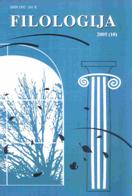Konceptualiųjų metaforų etinis aspektas advokatų kalbose
Ethical Aspect of Conceptual Metaphors in the Speeches of Trial Lawyers
Author(s): Regina KoženiauskienėSubject(s): Language and Literature Studies
Published by: VšĮ Šiaulių universiteto leidykla
Keywords: concept; conceptual metaphor; tropes; ethical arguments; function of argumentation; universal audience
Summary/Abstract: It is characteristic to the conceptual metaphors in the speeches of Lithuanian trial lawyers that they play a role of evaluation of undesirable and especially negative criminal phenomena. Such type of metaphors create a clear picture representing the strain between good and evil, justice and lie, and a fight between the light and the darkness. This performs a rhetoric function that helps to convey certain information in most precise way and to embody the content that is expressed by visual means. Metaphoric pictures that are created by a contrast principle perform a function of a psychological argumentation. The trial lawyer that puts efforts in convincing the judges by using metaphoric expressions portrays that the person which fights against a deadly ilness or a disaster and which tries to escape from that disaster or to overcome it is worth of indulgence and compassion by the judges. It is understandable that this does not usually causes the acquittal of the person that is defended because this requires logic arguments based on evidences. Nevertheless the trial lawyers are required to fulfill their mission of defence, thus they try to portray the situations that sometimes circumstances are more powerful than a person, and they search for extenuating circumstances in terms the punishment to be not too heavy and to correspond the crime. According to this the requalifying of actions, mitigation of guiltiness and correspondingly mitigation of the punishment are expected in turn. While defending their accusatories using the conceptual metaphors, the trial lawyers however express their civic position and a point of view that condemns the crime. Such metaphors become arguments of common condemnation and a kind of a secret and probably unconscious code of understandable communication with prosecutors and judges that is intended to describe behavior of a defended person and his unjustifiable actions.
Journal: Filologija
- Issue Year: 2005
- Issue No: 10
- Page Range: 52-56
- Page Count: 5
- Language: Lithuanian

